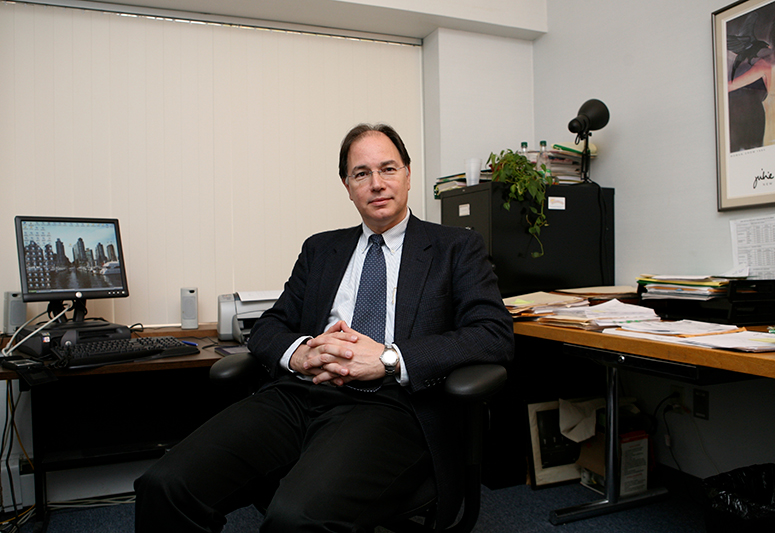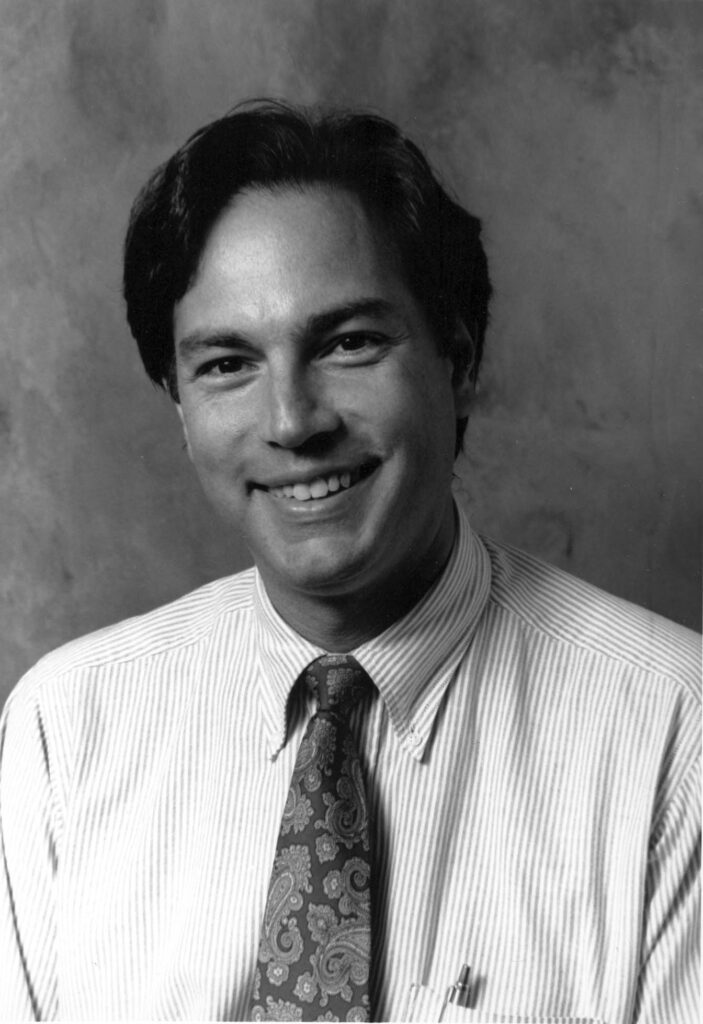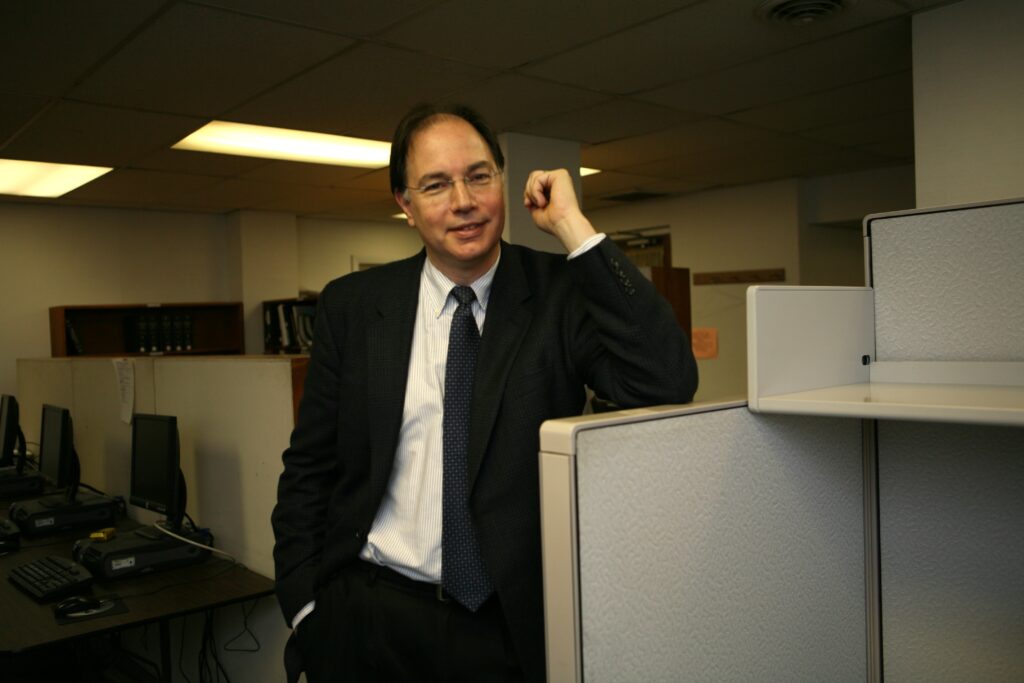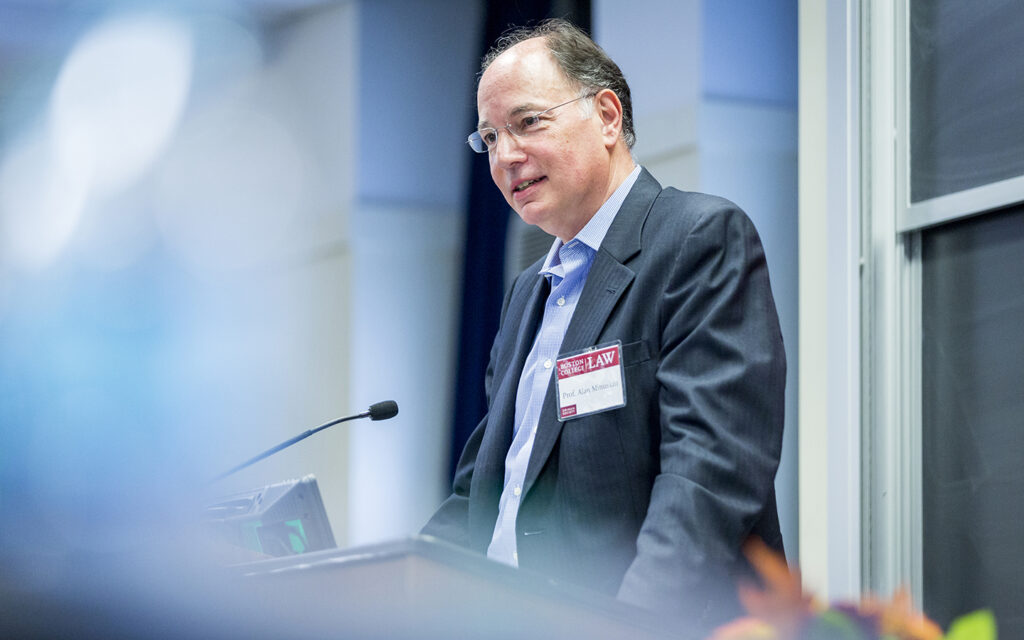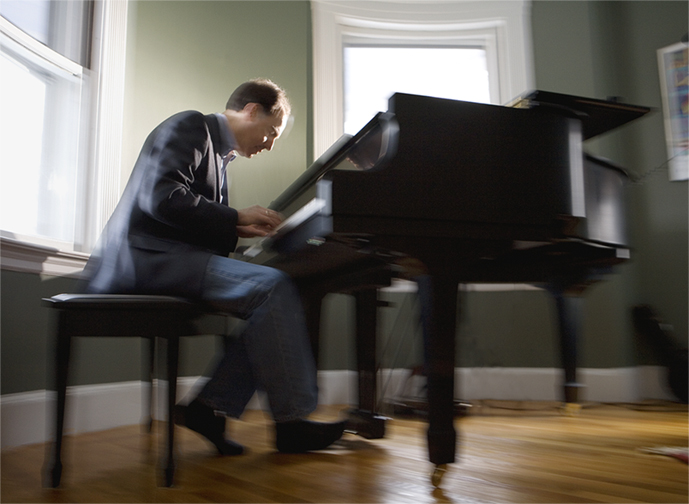BC Law Magazine sat down with Professor Alan Minuskin to discuss his career. For many years, he taught, supervised, and directed the Law School’s Civil Litigation Clinic. In recent years, he has directed the Housing Justice Clinic focusing on homelessness prevention through eviction defense. He has taught a wide range of other courses, including Introduction to Civil Litigation Practice, Negotiation, Pretrial Litigation, and Introduction to Lawyering, and Professional Responsibility. His courses, both clinical and simulation, have taught students how to practice law in tense litigation environments.
For eleven years prior to joining the BC faculty, Professor Minuskin was a member of the clinical faculty of New England School of Law where, in his final two years, he directed its clinical programs. Prior to his move to clinical teaching, he worked as a legal services lawyer at Central Middlesex Legal Services, the Cambridgeport Problem Center (now DeNovo Center for Justice and Healing), and as a co-grantee of federal legal services funding for provision of free legal services to the poor.
Professor Minuskin received Boston College Law School’s Outstanding Professor of the Year award twice during his career (1999 and 2017). His career at BC Law is coming to a close this year.
This interview was conducted by Bella Burrell ’25.
Bella Burrell: Let’s start from the beginning. Can you tell the readers a bit about your own background prior to joining BC Law?
Professor Alan Minuskin: I went to law school reluctantly. I thought I’d learn the law, but wasn’t sure it was the right direction for me. Once I was there, I got very interested in doing public interest work. I was in law school from 1972-1975, a time when the Vietnam war ended, Watergate happened and was exposed, and the need for advances in civil rights was a top priority for people who chose to go to law school.
Burrell: Wow.
Professor Minuskin: Those contextual events made it really important to me to use my legal education to help level a severely imbalanced playing field. After law school, I worked as a legal services lawyer for three years before very fortunately being invited to join the clinical faculty of New England School of Law. My thinking then was that, if being a legal aid lawyer would enable me to help as many clients as I could juggle at one time, then having a small army of law students under my supervision would enable me and my students to deliver more sorely needed services. [We could do so] while also exposing future lawyers to the joys and importance of serving clients who could not afford lawyers as they faced homelessness, domestic violence, and loss of safety-net benefits to which they were entitled from the government. When I began clinical teaching, I didn’t think I’d be doing it for that long, maybe two years. Those two years turned into forty-six. As I look back, I feel incredibly fortunate to have had a career that were perfectly matched to my abilities and interests.
Burrell: How did you eventually come to BC Law?
Professor Minuskin: There was a visiting position open at BC’s Legal Assistance Bureau. I decided to take the opportunity and see where it would take me. My friend and New England Law colleague, [Professor] Mark Brodin, had also started teaching at BCLS a few years prior, and I always had a tremendous amount of respect and affection for him. I began to learn more about Boston College Law School and its Jesuit roots. The opportunity to teach clinics here and my experience at BCLS exceeded all of my expectations about the Jesuit commitment to learning and service intertwined.
Burrell: What about those Jesuit values particularly resonated with you?
Professor Minuskin: I learned that Jesuits believe that it’s not enough to be an intellect, to be inside the academy to think great thoughts, give lectures, and write papers and articles. Jesuits believe in leaving the academy for periods of time to go where the trouble is and to do something about it. They would bring those experiences back to the academy to teach from them. They would then go again and again to where they were needed and provide desperately needed help to those in trouble. It was and is this continuous spiral of learning and service and teaching and more service that has struck a strong chord with me throughout my career.
Burrell: What are some common values shared by your best clinic students over the years?
Professor Minuskin: I think a strong clinic student demonstrates initiative, curiosity, drive, and compassion for people in dire legal predicaments who cannot afford to hire lawyers. They are creative and brave enough to be willing to make mistakes and address them professionally. And, by the way, when I think about the “best” clinic students, I’m not talking about those who have gotten a top grade. I’m talking about those who advanced their understanding of what it means to be a lawyer, to be a really excellent lawyer. Students with these qualities have excelled. One of the great benefits of my job is having gotten to know my students very well, which has led to some of the most gratifying long-term friendships I have made.
Burrell: Do you think all law students should do a clinic?
Professor Minuskin: Yes, I think experiential educational opportunities are essential to students’ development of the skill sets and overall professionalism they will need in practice. I also think opportunities to put law into practice enhances students’ understanding of law. I think every student who intends to practice law should take a clinic and an externship. If you look at other types of professional education—medicine, teaching, social work, nursing, architecture, psychology—most of students’ curriculum is devoted to settings in which they can learn by doing, actually practicing those professions under close supervision.
Legal education has long lagged behind other professional education in this regard. Much of this has roots in the way legal education in the United States evolved since the late-1800s. The emphasis has traditionally been on learning how to analyze legal principles, how to “think like a lawyer” about the law. And that’s true. But our students, who will be fully licensed lawyers within months after receiving their degrees, also need to know how to do stuff, how to talk to a client, build a case, negotiate, and, in litigation settings, argue and try cases. There are just so many things that a good lawyer needs to know how to do that cannot be learned in a lecture or Socratic setting; you have to learn them by doing them.
Burrell: What kinds of skills do you think are only learned in the clinic environment?
Professor Minuskin: Working with people in distress comes quickly to mind as an example. When people go to lawyers for help with litigation matters, no matter where they come from, they’re not happy. They’ve got a legal problem in which either somebody has done something to them and they need redress or somebody is coming after them and they need to defend themselves. You can’t learn how to work with a client who is feeling those things unless you work with a real person in a real setting in real time. I’ve developed and taught elaborate simulation courses using professional actors to play roles, but most of what we see in actual practice is stuff you just can’t make up. Multiple motivations, including emotional ones, exist between parties, witnesses, lawyers, and court personnel. A good lawyer has to develop the sensitivity to navigate all of that agilely.
Burrell: Of course. And in providing services from the clinic, you’re really focused on providing access to legal services to those who cannot otherwise get representation. In your opinion, how can we make legal services more available to people?
Professor Minuskin: Legal clinics are part of a constellation of approaches to this issue. Technology has also been a major game changer in the past decades, and it will continue to be a driving force. Using online programs makes things more accessible. For example, there is currently a statewide, coordinated effort to create opportunities for tenants to fortify their abilities to secure new places to live. An online program is launching that will allow tenants to seal records relating to prior legal battles with landlords, records that may dissuade prospective landlords from renting to them. Programs like these allow us to get the word out and give people tools to do things themselves.
In addition, we have to continue to provide excellent community education. My students and I have done much community outreach over all these years where we tell groups of people about resources for issues they might commonly face. For example, we’ve spoken about the rights of domestic violence survivors, tenants being taken advantage of by their landlords. We have spoken to community groups, professionals, in churches, and other settings. We must empower our clients, and we do that by helping clients understand how they can stand up for themselves once they are educated about their legal rights and responsibilities.
Burrell: What are some notable highlights from your time directing a clinic?
Professor Minuskin: There are too many to name, but it really is the closeness of the work I have been privileged to do with students and their clients. Because the ratio between student and supervisor in a clinic is lower than in classroom courses, and because the work is so intense, students and clinical faculty get to know each other very well. Some of my closest friendships are with my former students. Some of my former students are judges. I’ve been doing this long enough that some of my former students are retired judges. Some have been practicing law for thirty years, some have only been practicing for four.
Literally, everybody’s been fun to work with, even (and perhaps especially) students for whom the work has been most challenging. I truly have loved figuring out how, for each of my students, I could tailor our relationship with their experience to optimize their learning. And beyond getting to do that, I get to see my students grow, advancing into their professional selves day after day, and week after week.
Burrell: Are there areas, as you reflect on your time at BC Law, that you think need further development in the clinic space?
Professor Minuskin: We have excellent clinics. The array of subject-matter areas we cover is solid. The clinical faculty couldn’t be stronger. When I started in 1990, there were four faculty teaching and supervising in the Civil Litigation Clinic at the Legal Assistance Bureau in Waltham where we represented clients in family law, housing, and public benefits matters. And there was a criminal justice clinic, with defense and prosecution components, housed at the Law School. That was pretty much it.
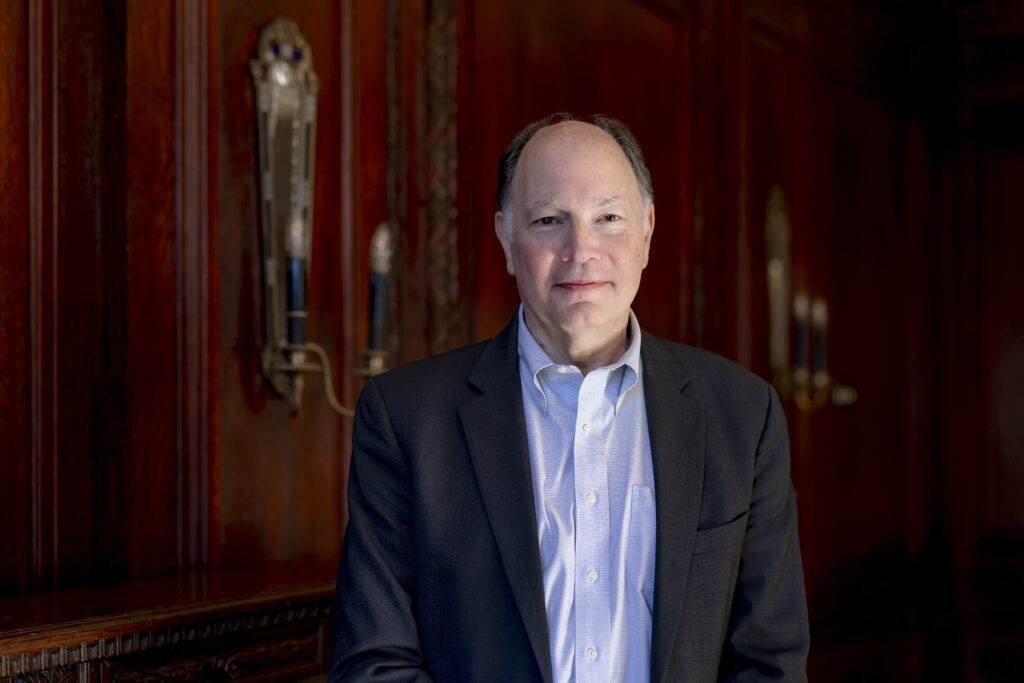
We now have a Civil Rights Clinic, a Community Enterprise Clinic, a Compassionate Release and Parole Clinic, a Criminal Defense Clinic, an Entrepreneurship and Innovation Clinic, an International Human Rights Clinic, an Immigration Clinic, a Housing Justice Clinic, a Housing Court Lawyer for the Day Clinic, and a Youth and Family Rights Clinic. Undoubtedly, there are exciting directions in which we may expand to increase clinical offerings to our students, provide additional sorely needed services to clients who qualify for them, and to ramp up our competitiveness with peer law schools. We should be looking to expand the size of our clinical faculty, which, despite new clinics on our menu, has not grown much at all over the past fifteen to twenty years.
There are three categories of law schools when it comes to what they can promise their students. First, there are law schools that have clinics; this is virtually every law school in the country. Second, there are law schools that guarantee that every student who wants to has certain clinical training prior to graduation will have it. Third, there are law schools that require all students to take a clinic as a graduation requirement. Currently, BCLS is in the first category, but I’d like to see us move to the second category.
Burrell: What are some current challenges facing clinics?
Professor Minuskin: If you want to talk nationally and in terms of the past few months, then there are many. The Trump administration has begun to attack law school clinics that it suspects are advancing interests contrary to those of the White House. While this is no different than attacks on higher education in general or on law firms, it is alarming and amounts to serious challenges on the horizon. More broadly, however, the legal work clinics perform on behalf of their clients has always been difficult, but it is rapidly becoming more difficult as federal policies are increasingly shaped to hurt those clients. Immigration protections, housing availability, healthcare availability, the well-being of children, the missions of nonprofit organizations, the rights of the accused, the rights of incarcerated people, the health of the environment, and workers’ rights are all frighteningly vulnerable. The rule of law, itself, is under attack. As many have said, challenges almost always provide opportunities for positive reform. Law school clinics are destined to seize those opportunities.
Burrell: Point well-taken.
Professor Minuskin: But, more specifically concerning legal education, I think ensuring that practice education becomes more central to the Law School curriculum is extremely important.
Burrell: Shifting from solely your work with clinics, you’ve also been involved with BC Law overseas. You headed the London Semester in Practice program five times. What was that program about and what were some highlights from your time participating?
Professor Minuskin: That was really a joy. The London program was created in the late 1980s by Professors [Cynthia] Lichtenstein and [John] Flackett. They were both outstanding members of the faculty. Professor Flackett was born in England and Professor Lichtenstein was a widely recognized international scholar. The two of them created an externship program in association with the law school at King’s College in London. After they’d alternated as directors of the program for over a decade, they and the Law School administration began looking for other professors to rotate in to run it. I first directed the program in 2002.
I was thrilled by the possibilities for collaboration and cross-pollination the program afforded. You take students out of the United States legal system and place them in international human rights organizations, big law firms, banks, or environmental organizations and you just see what happens. The students are so stimulated by noticing the differences between what we have taken for granted in the US and what the norms are in other places. I loved that. And, of course, I always got to know program students very well. When you’re in another country together in a small cohort, camaraderie intensifies. You’re together in classes, on tours of legal institutions, listening to guest presentations, and in pubs discussing what we were all seeing and learning. It was a fantastic program, and it continues in Ireland now.
Burrell: It sounds like an amazing opportunity. You’ve taught many other classes throughout your time at BC Law, including Introduction to Civil Litigation Practice, Critical Perspectives, Negotiations, Pretrial Litigation, Introduction to Lawyering, and Professional Responsibility. What has been your favorite class to teach outside of your clinical work?
Professor Minuskin: Most of the other courses I’ve taught are simulation courses that I invented. In Pretrial Litigation, I hired eighteen professional actors to play elaborately written roles to create the alternative reality of a litigation that spanned the entire semester. That experience was exhausting, but very rewarding. All the courses I’ve taught are different. I’ve loved teaching Critical Perspectives as a small group faculty member since its creation four years ago. I loved teaching Intro to Civil Litigation as a 1L elective. They’re all really fun. I have always intended to make what students are doing in my classroom fun. Sometimes, the fun comes from noticing some of the absurdities that are integral to the law, the legal system, and law practice. Sometimes, it’s just a matter of not taking ourselves overly seriously. I don’t think I can pick a class that is my single favorite.
Burrell: Fair enough. Over your career, are there any ways that you think the clinic structure has shifted?
Professor Minuskin: We have more of them, a much greater diversity. It’s not quite the Cheesecake Factory menu, but it is a really admirable array of opportunities for students. As I said before, I think we should be looking to expand practice opportunities for students so we can honestly commit that their legal education is preparing them for what they will be doing as lawyers. We’re now doing better than ever, and we’re going to do even better as we continue to grow.
Burrell: Have there been any notable shifts in the BC community over your time here?
Professor Minuskin: I think the Law School, as a community, has always had solid, commendable core values. We have long been in a very good position nationally for many good reasons, but I don’t think it’s ever been better than where it is now. I think we are immensely fortunate to have Dean [Odette] Lienau’s leadership. Our community is loaded with nationally recognized experts on just about every important legal question. They are excellent at what they do, and when there’s trouble in our country or in the world—of which we have plenty now—their voices are out there enhancing understanding and moving sentiment in positive directions. Our graduates are making a huge difference in their professional capacities and as friends and neighbors to others.
Burrell: The lack of change in terms of our values seems particularly important right now, like you mentioned.
Professor Minuskin: Exactly. There was a chapter of my time at BCLS that stands out on this point. In the mid-1990s, I chaired a task force to address the problem of military recruiters coming to our campus during the Don’t Ask, Don’t Tell era. The recruiters were prohibited by their superiors from signing a pledge required by the Law School that they would not discriminate in hiring on the basis of sexual orientation. The federal government was threatening to withhold federal funding from those institutions of higher education who didn’t allow on-campus military recruitment. Does that sound familiar?
Burrell: Oh, wow. Yes, it definitely sounds familiar.
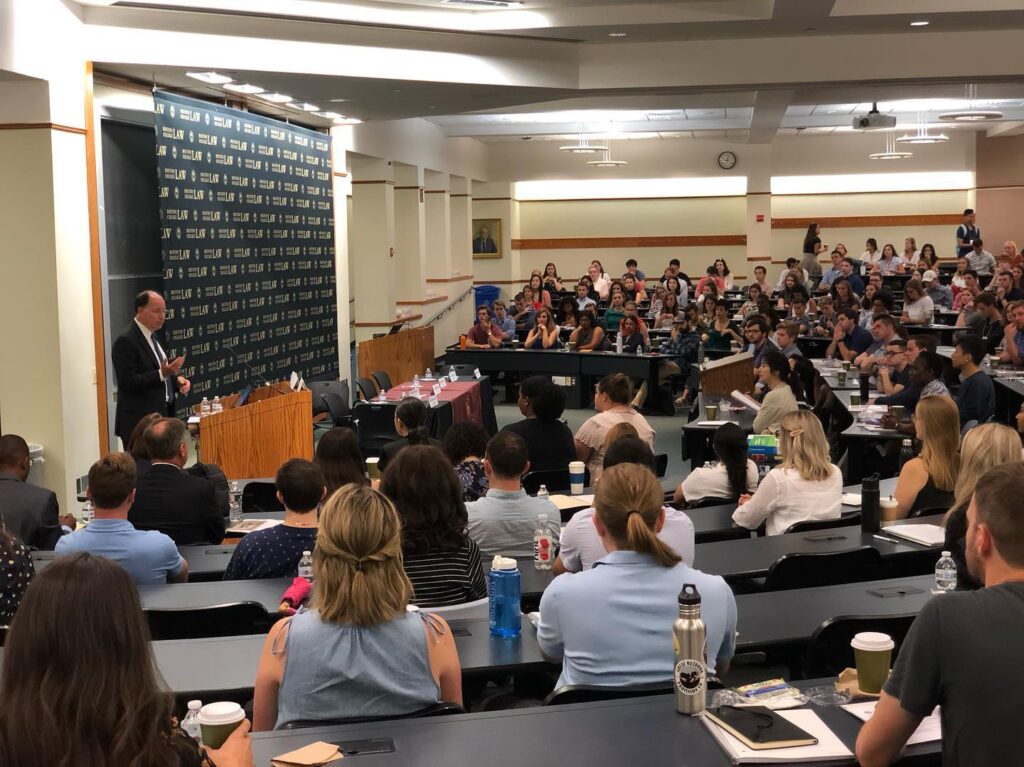
Professor Minuskin: Our dean in the 1990s asked for volunteers to comprise the task force. When I volunteered, he asked me to chair it. I permitted every member of the BCLS community who wanted to be a member of the task force to be on it. We had over fifty students, staff, and faculty. We did amazing things during that period to research, investigate, and make recommendations concerning school policy. In the process, we brought dozens of prominent speakers to campus and took a national lead to defend against government interference with school policies to which we were committed. The discriminatory Don’t Ask, Don’t Tell policy was repealed in 2011, as we knew it eventually would be, but the most important consequence of our work was using our voices to stand up for a just school policy despite threats of financial retaliation. I thought I would dread the role I undertook, but I actually relished it. I was so proud of the Law School then for its commitment to all of its students and for standing firm against attempts at intimidation.
Burrell: It cannot go unsaid that you’ve had a tremendous impact on the lives of students that you’ve taught and supervised over your career. What drives you as a professor and what keeps you engaged in this subject matter?
Minuskin: I never would have become a lawyer just for the law. That’s, of course, been an important component, but I’ve been most driven by my desire to advance and protect people who I care about. That includes the countless clients we’ve helped, as well as the bright, kind students I’ve mentored and supported through their journey into the legal profession. I have enjoyed learning who my students are and figuring out how I could best meet them where they were. I cannot say every single minute has been fun, or that this work has not been, at times, incredibly stressful. We’ve seen some of our clients get moved out of their apartments. It’s extremely rare, but it happens. But overwhelmingly it’s been immensely gratifying and tremendous fun. I mean, otherwise, why would I come back after retirement to do it? [Ed. note: Professor Minuskin will remain involved in clinics after retirement to help run the newly established Lawyer for the Day clinic.]
Burrell: If you were able to control the narrative entirely, how would you define your own legacy? What would you want people to take away from your experience and time here?
Minuskin: I hope people remember me as a really good clinical supervisor and professional mentor. I was dedicated to understanding my students, what was driving them, what they needed, and how I could meet them where they were to make their development as excellent
lawyers happen. I wanted all of my students to not just be successful, but also happy lawyers who understand themselves professionally and personally. And, in that process, we advanced and protected the rights of countless people who faced terrible problems in their lives, ranging from domestic violence to homelessness to fighting over custody of children, or losing safety net benefits from the government that they shouldn’t be losing.
I would like to think that I’ve done a good job of managing all of that for everyone’s benefit. I’ve had a great career, and I’m very thankful for my time here.


